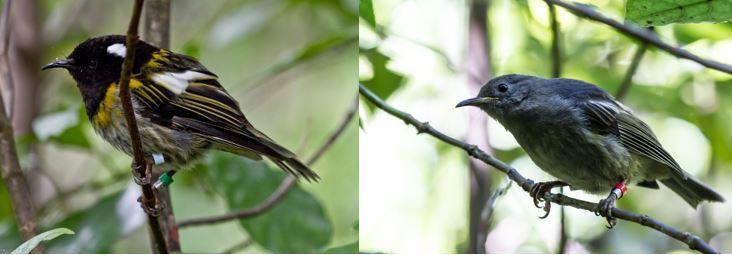Hihi return to Shakespear Regional Park
Staff Reporter
18 June 2024, 8:39 PM
 Rare native birds translocated for summer
Rare native birds translocated for summerCoasties and visitors to Shakespear Regional Park may have the unique opportunity to spot the rare hihi (stitchbird) this summer.
Forty hihi, one of New Zealand’s rarest forest birds, have been translocated from Tiritiri Matangi Island to the open sanctuary at the regional park, which is a pest-free haven for threatened native species.
The hihi are known for their curiosity, often approaching people.
Auckland Council Senior Ranger Open Sanctuary Matt Maitland advises birdwatchers to look for a small, fantail-sized bird with a white wing bar and a high-pitched whistle.
Males are especially distinctive with their black heads and yellow neck markings.
The translocation effort was a collaborative project involving Auckland Council, the Shakespear Open Sanctuary Society (SOSSI), and Ngāti Manuhiri Settlement Trust, with support from the Hihi Conservation Charitable Trust, the Department of Conservation Hihi Recovery Group, and Supporters of Tiritiri Matangi.
In the late 1880s, hihi lived in multiple forest locations across the North Island, but the only naturally surviving population today is on Te Hauturu-o-Toi / Little Barrier Island.
Since 2004, a recovery plan led by the Department of Conservation has established seven populations on predator-free islands and protected sanctuaries.
Despite this, hihi recovery remains uncertain, and adaptive management is essential for ongoing success.
"The project aims to establish the eighth secure hihi population in New Zealand," said Maitland.
"The open sanctuary has the necessary factors for this translocation to succeed, and we hope this project will significantly contribute to hihi conservation."

A male hihi (left) and female bird. Photos/ Janice McKenna
Shakespear Regional Park already hosts many native birds, including korimako (bellbird), kākāriki (red-crowned parakeet), kererū (pigeon), ruru (morepork), kotare (kingfisher), pīwakawaka (fantail), tauhou (silvereye), and tui.
Maitland hopes the hihi will thrive alongside other successfully translocated species like the kiwi pukupuku (little spotted kiwi), popokatea (whitehead), toutouwai (robin), and tīeke (North Island saddleback).
Each hihi will be closely monitored throughout winter to ensure they are well fed with supplementary nectar and have access to safe nesting boxes.
Councillor Richard Hills praised the dedication of rangers, external partners, and the local community for maintaining the sanctuary’s effectiveness through pest control, monitoring, and habitat restoration.
"This network of passionate conservationists has consistently achieved zero predator control targets since a pest-proof fence was built in 2010. They are truly committed to protecting and conserving the precious biodiversity in this wildlife reserve that we are so lucky to have on our doorstep," he said.
All hihi whakapapa to Hauturu o Toi and are considered taonga to Ngāti Manuhiri, the iwi with ancestral connections to Hauturu, Tiritiri Matangi, and Shakespear.
Ngāti Manuhiri Settlement Trust spokesperson Delma O’Kane acknowledged the dedication of all involved in this conservation effort.
"It is through their unwavering commitment to pest control, monitoring, and habitat restoration that Shakespear Regional Park continues to thrive as a sanctuary for our native flora and fauna," she said.

FOOD & SHOPS
TRADES & PROFESSIONAL SERVICES


